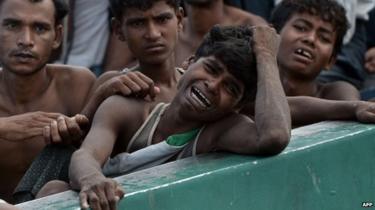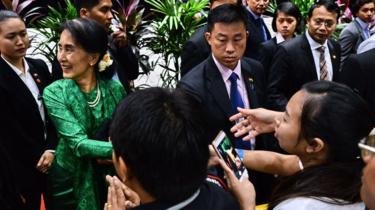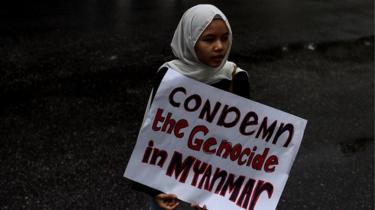In recent months, tens of thousands of Rohingya have fled to Bangladesh amid a military crackdown on insurgents in Myanmar's western Rakhine state.
They have told horrifying stories of rapes, killings and house burnings, which the government of Myanmar - formerly Burma - has claimed are "false" and "distorted".
Activists have condemned the lack of a firm international response. Some have described the situation as South East Asia's Srebrenica, referring to the July 1995 massacre of more than 8,000 Bosnian Muslims who were meant to be under UN protection - a dark stain on Europe's human rights record.
What's happening?
Tun Khin, from the Burmese Rohingya Organisation UK, says Rohingyas are suffering "mass atrocities" perpetrated by security forces in the northern part of Rakhine state.
A counter-insurgency campaign was launched after nine border policemen near Maungdaw were killed in a militant attack in early October, but the Rohingya say they are being targeted indiscriminately.
Media caption'They set our houses and mosque on fire'
The BBC cannot visit the locked-down area to verify the claims and the Myanmar government has vociferously denied alleged abuses.
But UN officials have told the BBC that the Rohingya are being collectively punished for militant attacks, with the ultimate goal being ethnic cleansing.
What led to the current situation?
The Rohingya are one of Myanmar's many ethnic minorities and say they are descendants of Arab traders and other groups who have been in the region for generations.
But Myanmar's government denies them citizenship and sees them as illegal immigrants from Bangladesh - a common attitude among many Burmese.
The predominantly Buddhist country has a long history of communal mistrust, which was allowed to simmer, and was at times exploited, under decades of military rule.
Image copyrightGETTY IMAGES
Image caption
Thousands of Rohingya have been forced to live in camps
About one million Muslim Rohingya are estimated to live in western Rakhine state, where they are a sizable minority. An outbreak of communal violence there in 2012 saw more than 100,000 people displaced, and tens of thousands of Rohingya remain in decrepit camps where travel is restricted.
Hundreds of thousands of undocumented Rohingya already live in Bangladesh, having fled there over many decades.
UN: Myanmar wants ethnic cleansing
Learn more about Myanmar
Where is Aung San Suu Kyi?
Since a dramatic Rohingya exodus from Myanmar in 2015, the political party of Nobel Peace Prize winner and democracy icon Aung San Suu Kyi has taken power in a historic election, the first to be openly contested in 25 years.
But little has changed for the Rohingya and Ms Suu Kyi's failure to condemn the current violence is an outrage, say some observers.
"I'm not saying there are no difficulties,'' she told Singapore's Channel NewsAsia in December. "But it helps if people recognise the difficulty and are more focused on resolving these difficulties rather than exaggerating them so that everything seems worse than it really is.''
Her failure to defend the Rohingya is extremely disappointing, said Tun Khin, who for years had supported her democracy activism.
The question of whether she has much leverage over the military - which still wields great power and controls the most powerful ministries - is a separate one, he said.
"The point is that Aung San Suu Kyi is covering up this crime perpetrated by the military."
Image copyrightAFP
Image caption
Aung San Suu Kyi mostly avoided the Rohingya question on a recent official visit to Singapore
But others say international media fail to understand the complex situation in Rakhine state, where Rohingya Muslims live alongside the mostly Buddhist Rakhine people, who are the state's dominant ethnic group.
Khin Mar Mar Kyi, a Myanmar researcher at Oxford University, told the South China Morning Post that the Rakhine were the "most marginalised minority" in Myanmar but were ignored by Western media, which she 


Hi! I am a robot. I just upvoted you! I found similar content that readers might be interested in:
http://www.bbc.com/news/world-asia-38168917
Downvoting a post can decrease pending rewards and make it less visible. Common reasons:
Submit